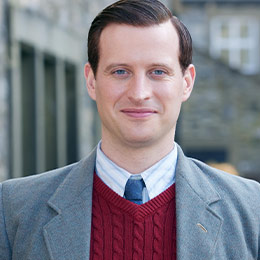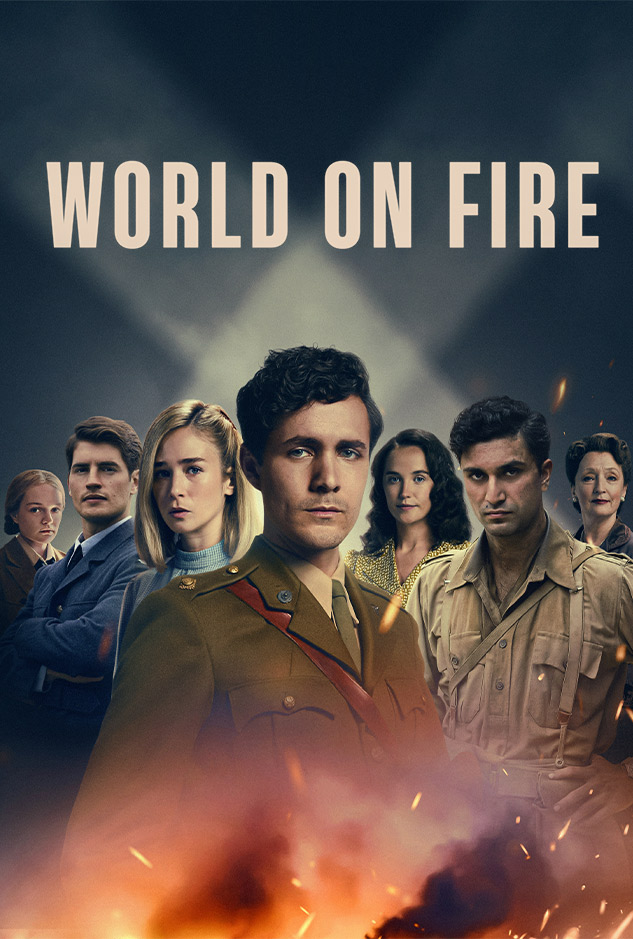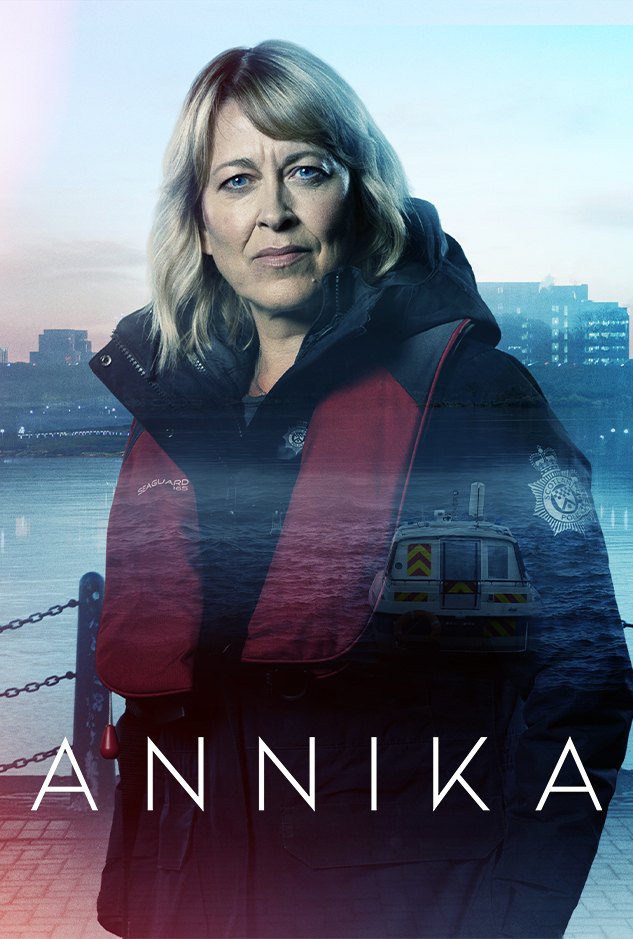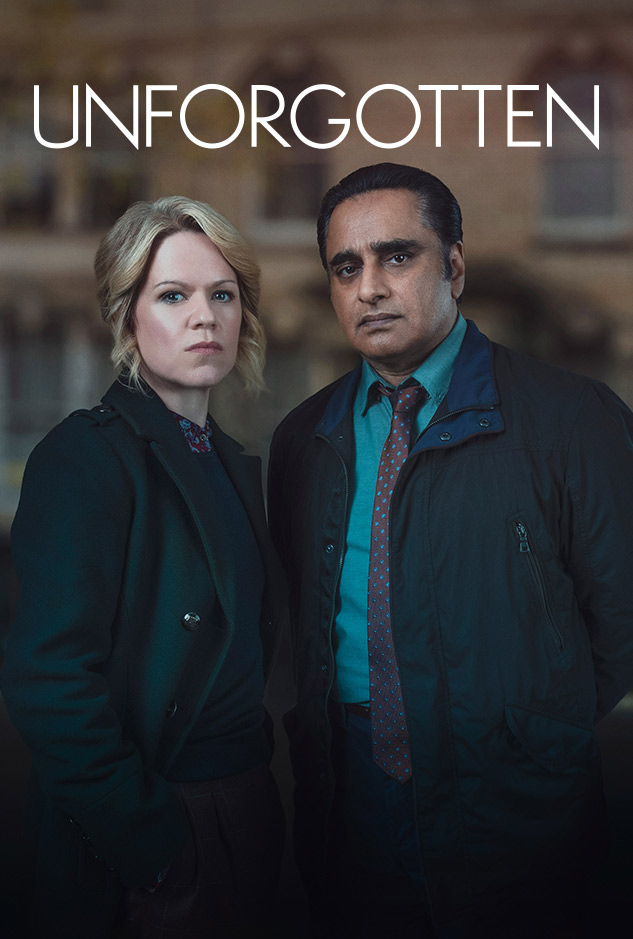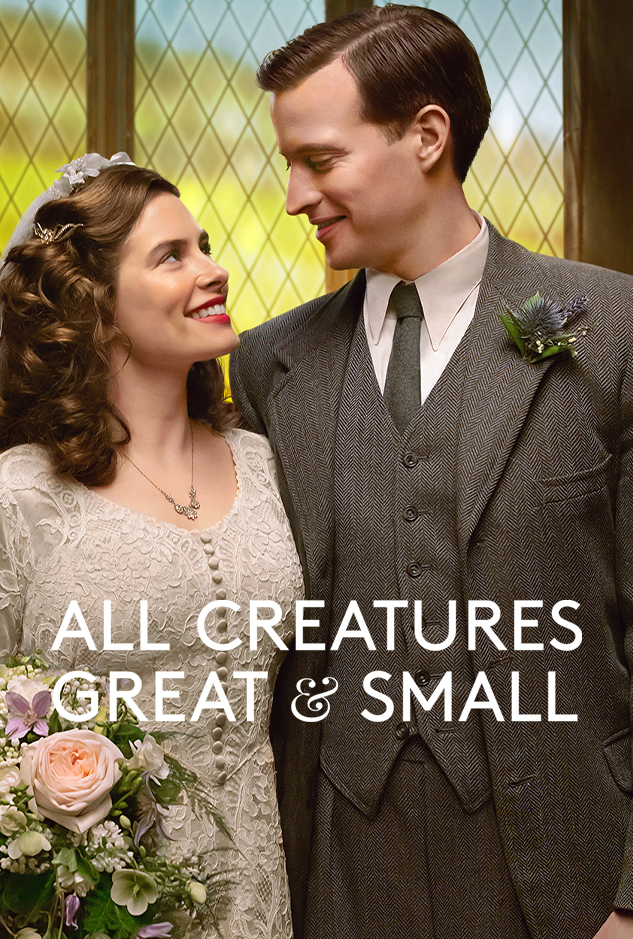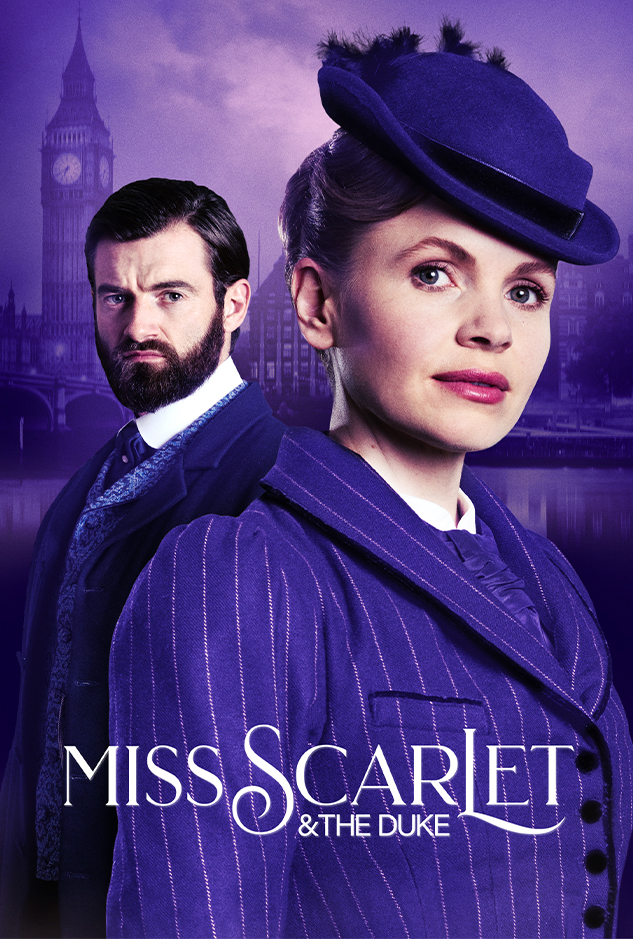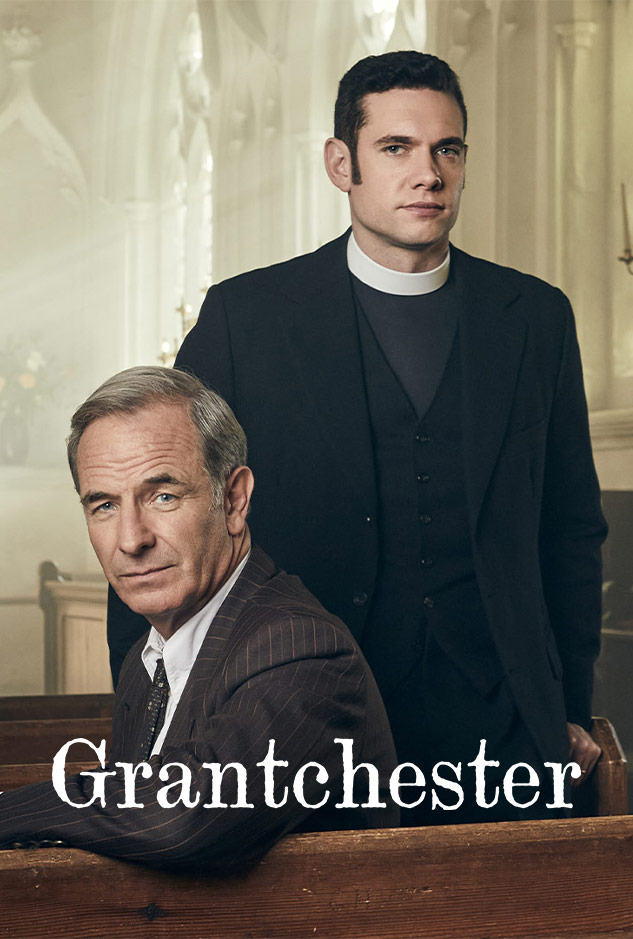Discover the Animals of All Creatures Great and Small
Want to know about nearly all the animals, great and small, that you see onscreen in the 2021 TV adaptation of All Creatures Great and Small? Animal handler Jill Clark, who runs 1st Choice Animals along with her son Dean, shares funny and moving stories about the show’s animals, from the cows to the parrot; describes the nurturing care they receive on and off camera; and spills the beans on that diva, Tricki Woo. Meet the animal actors and learn about their care and their craft in Jill Clark’s exclusive interview!
For more behind-the-scenes exclusives, subscribe to the All Creatures Great and Small Insider, a weekly episode-related newsletter! When you sign up, you’ll also get show-related emails from MASTERPIECE.
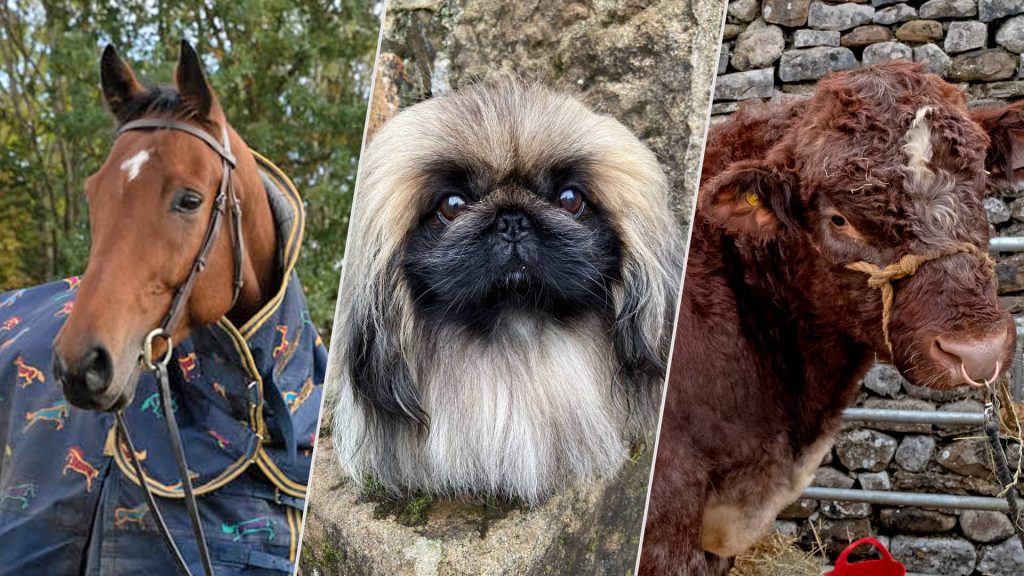

I understand that animal welfare is one of the highest priorities for the show. Can you explain the kinds of things that you and the trainers from 1st Choice Animals do on the show to ensure it?
It’s very much like looking after the children on the set—you have to go make sure every part of their welfare is met. They can’t be overworked, they can’t get stressed, and you have to be very aware of the temperature that’s all around them. We care for all their needs—the correct food that they have, the constant supply of water—just everything that they need. And the ability to carry out their own natural actions, so nothing is trained that the animal is not able to do naturally, so there is nothing forced on them.
Everything is done with positive reinforcement, with play or treats and praise. If you look at old films, you can actually see the doggie is looking or the animal is looking, and it’s a bit scared, and it looks a little bit wary about life. But if you watch all the animals on here, the tails are wagging, they’re happy, and they’re natural. They’re not scared of anything, because we haven’t put them into a position where they would be scared about anything, and they have total trust in us.
What are some examples of things you do for the animals, that might surprise viewers?
We set up their own pens and their own accommodations on set so they don’t have far to travel, and they come from their natural(ish) accommodation. So if we’ve got the cows, then we build a cow pen outside and bed them down with hay and straw, so they’re just standing there, as they would on a farm, and it’s all natural for them. Then they go into a natural surrounding on set.
Most of the cows are going into a barn, or the dogs are going into the vet. But it’s not a real vet, it doesn’t smell like a vet, so therefore they’re not worried. But even then, we would take them around to vets and get them used to going in and out of the vets, so they can understand the smells and the noises that are going on around them, and they don’t have any fear of it because they’re used to it.
We spend so much time before hand actually prepping them. If they’re going to be near a train station, then we take them to train stations to get them used to it, so that it’s no surprise when they’re there, and they can just do their acting. We spend hours and hours out all over the place with them. I used to train a lot of dogs on the train station just because there was so much noise, so many people, and they just get used to it.
What’s been a particular challenge in making All Creatures Great and Small?
Moving cows around Yorkshire. We have very strict government rules in terms of protecting animals, especially cows, who are susceptible to TB. So once they move, they have to stay in a place for a week. And they can’t travel alone—you can’t use one cow on its own, it always has to have a companion, because they’re herd animals. So trying to work that in with the filming schedule, when you might these cows in a different location, can be quite a logistical headache. Especially if you have issues with the schedule, if the weather affects you, which can happen a lot in the Yorkshire Dales. Sometimes we have to just halt filming for rain. You can’t film with chickens in the rain because their feathers would just be completely dampened. So there are certain restrictions within that particular region that can impact when you’re filming with animals.
How did you go about filming the delivery of the calf in Episode 1?
We had two birthing cows in the adjoining barn right next door to where we were staying. They were there for a few weeks beforehand, so they were quite used to us being in and being out, and in and out. We had set up a proper birthing pen for them and had 24 hours surveillance, so when they did start calving, the camera crew were there. We just went in quietly and filmed the birth. She wasn’t scared or stressed about anything, and they were quite happy for us to be in there with her when she was giving birth.
What can you tell us about Derek, the dog who plays Tricki Woo, and the pekingese as a breed?
I’ve really not had anything much to do with the breed up until Tricki Woo came along, but they’re incredible little dogs, the nicest, bravest little dogs I think I’ve ever met. They have their own personalities, which just seep out of them. When it comes to training, they’re very, very clever. Derek is a diva—he likes his own space and he likes to do what he wants to do. He is loved by everybody, and his personality shines out wherever he is—filming, out when we’re in the park, when we’re down at the beach—he just shines and people will stop and constantly want to talk to him…not even knowing that he’s Tricki Woo! They just love the breed, and they love Derek. He just seeps out with emotions. He’s such a nice little dog.
Can you tell us about some of the other animals we see in the series, and share any of their stories or peculiarities?
The parrot Gerry, I’ve had for years and years, more than I care to remember! She’s maybe about 40, 45 now. If you want her to do something, that’s peanuts. If you want her to nod her head, you just show the peanut to her, up and down in front of her, and she nods her head in front of that. She’s an absolute character.
She was in a bad mood one day on set, so she escaped out of her cage (which is something that she does quite easily—she just opens the cage and walks out), ran around, and terrified the dogs! The dogs don’t like her because she just chases them all over the place, which is funny to watch: she just walks up to them and squawks, and off they go. You’ve never seen so many dogs lined up against the back of the sofa, or climbed up on the back and sort of hanging off the edge of it, as when the parrot was out, since they don’t like her. She is very comical.
But they’re all very food-oriented. The donkey, George, works for his favorites, apples and carrots. Same with the rabbits. We work everything with food and patience. You can’t work out just how much patience you have to have to work with them. You can’t train them if you’re in a bad mood—it just goes straight through to them. Just don’t bother. Wait ’til everybody is really nice and happy, nice and relaxed, and then you can start working with them.
All mine are family pets. The horses that we keep are all ridden by various members of the family. The parrot’s mine, she’s been here forever. The cats I keep, they all work to buzzers or for special training, like the ginger cat. It had to go to sleep, so took lots of patience: Get him to lie down, lots of stroking, just get him to lie down, and then he eventually settles, and then it becomes a trained action for him just to lie down and lie still. Just with patience.
Filming with the donkey, George could be quite noisy, when you split him it up from his girlfriend, Daphne. He adores Daphne and they’ve been together forever, about 20 years now. And they talk to each other. So if you split them up, you have to leave Daphne at home: otherwise all you’ll hear is George eeyoring all over the place. If you want one to make a noise, take the other one with you and move them apart. George used to get evicted from everywhere he went because he was so noisy! He broke in to our front room one day, and it because was nice and hot and summery, the patio doors were open, and George wandered in and just eeyored straight into my son’s ear!
1 of 9
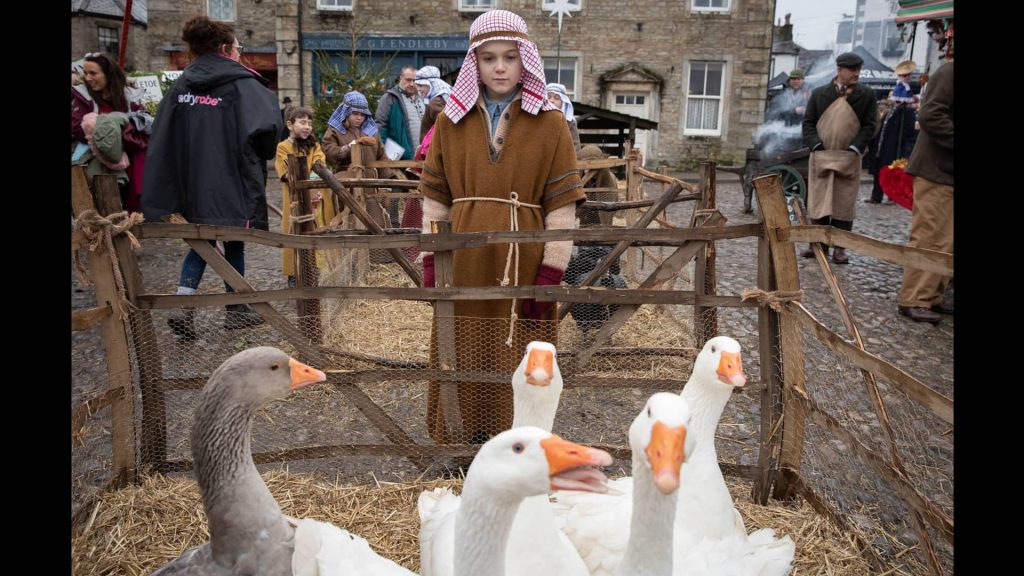

Clark cites geese and chickens as common in period drama because back then, so many people kept them for eggs and meat.
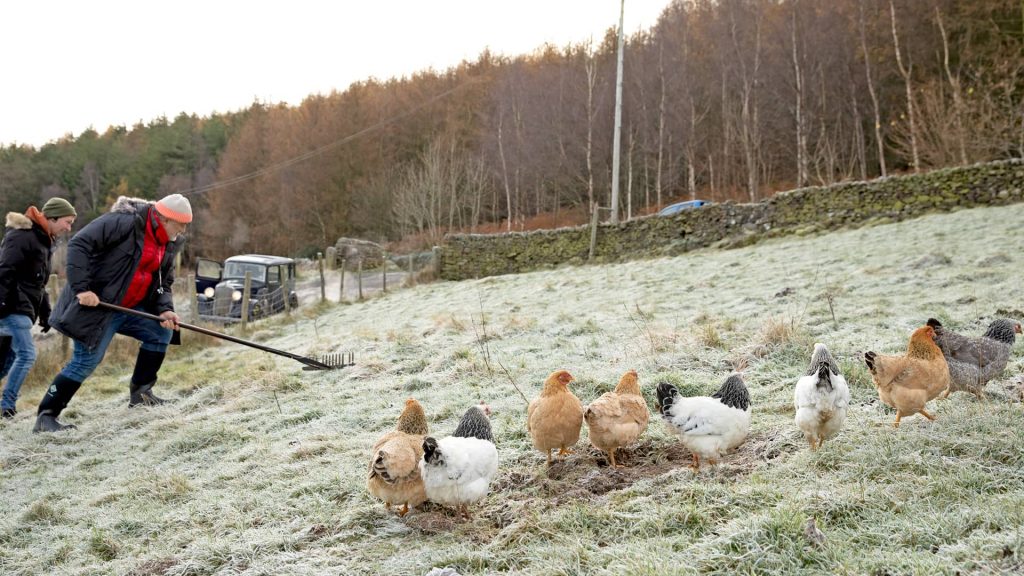

Chickens on location in the Yorkshire Dales.
Regulations require that cows must have a companion, because they are herd animals.
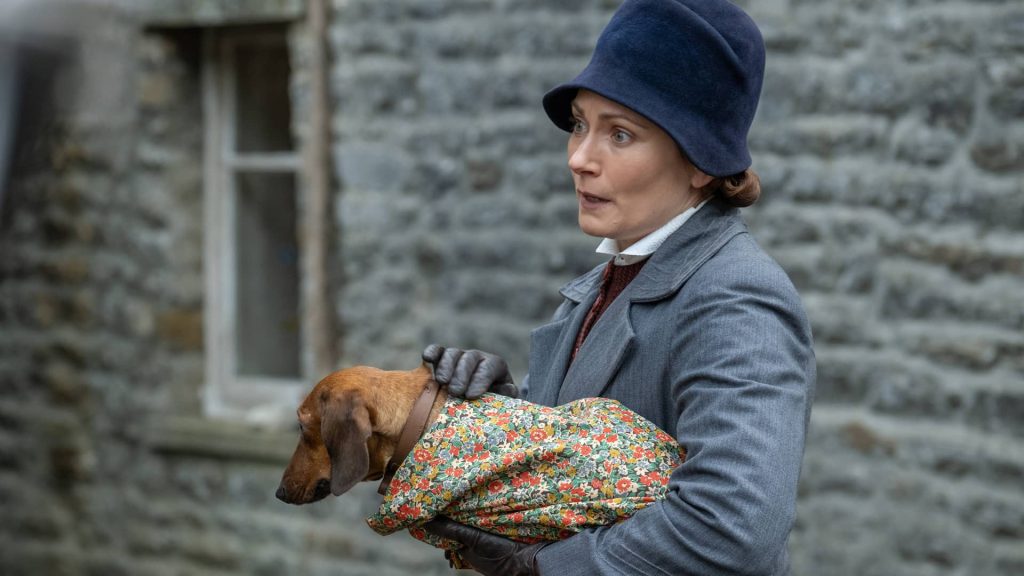

Anna Madeley (Mrs. Hall) holds the much-loved dachshund, Frankie.
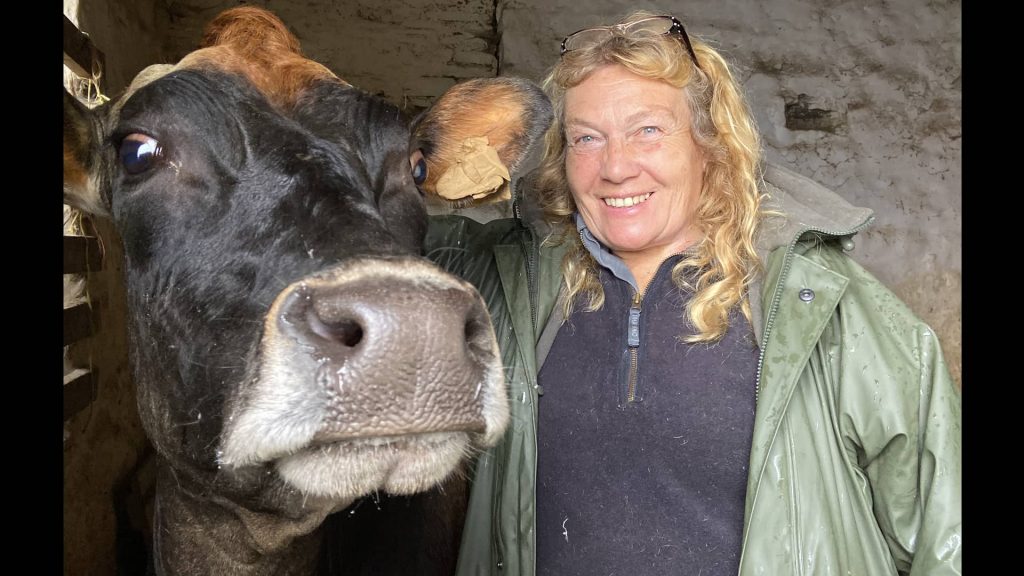

Animal handler Jill Clark on the set of All Creatures Great and Small.
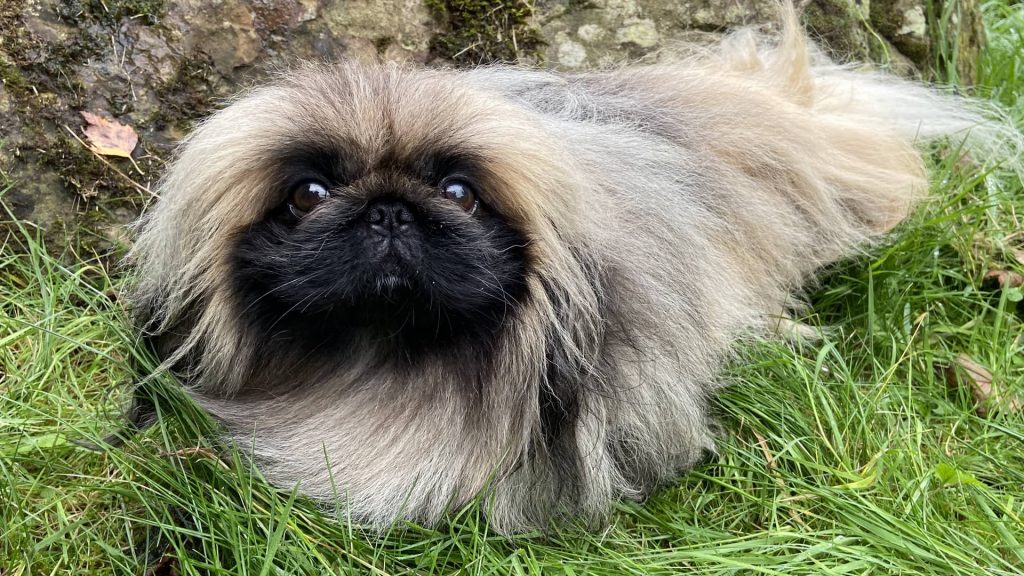

Derek, the pekingese who plays Tricki Woo
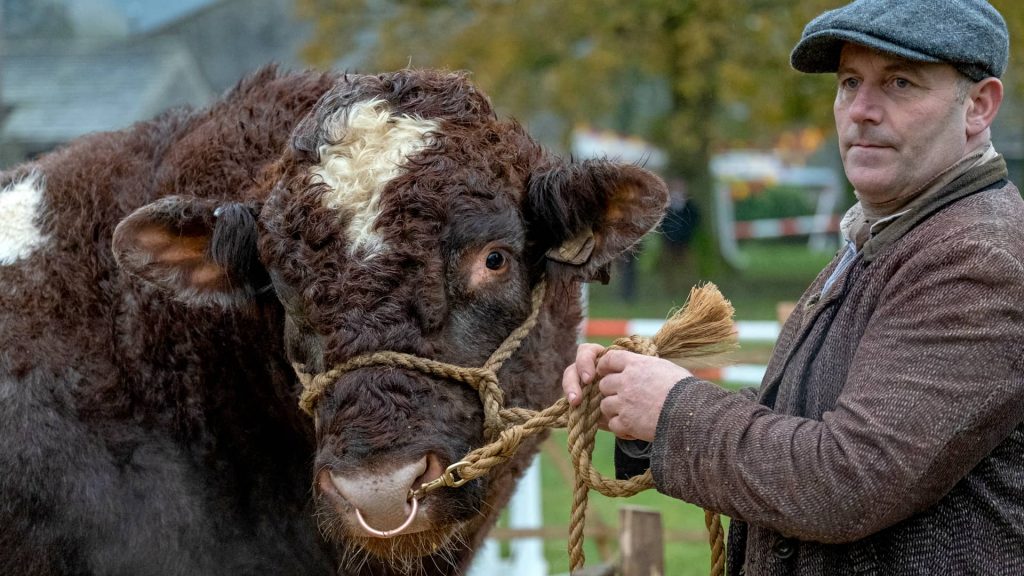

Jester, the bull who plays Clive
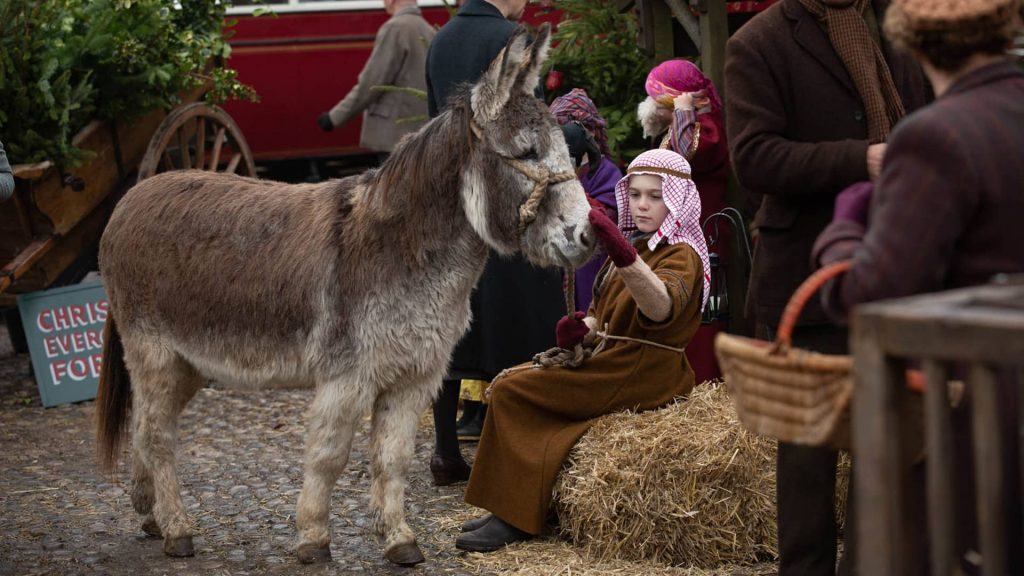

George the (noisy) donkey.
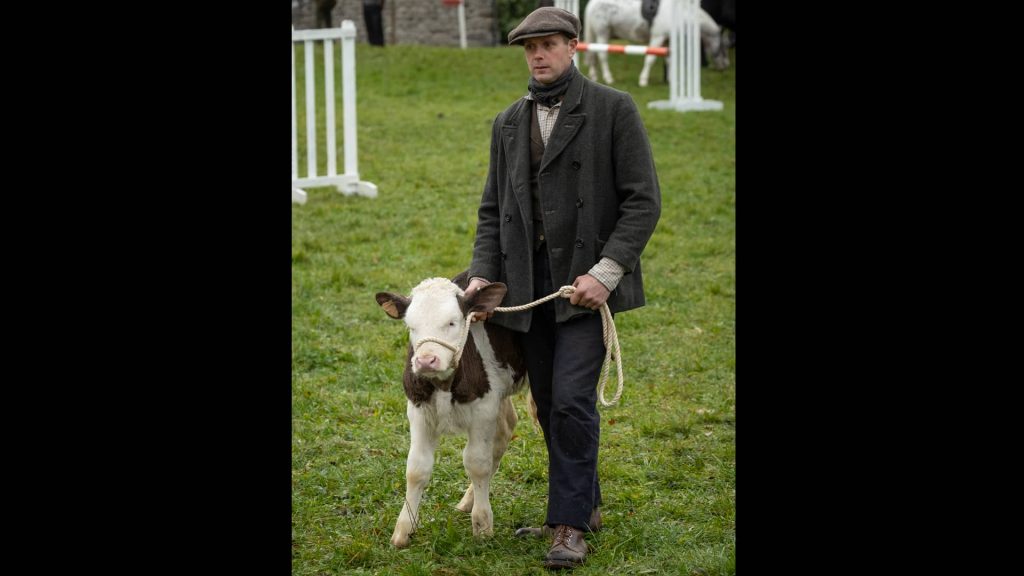

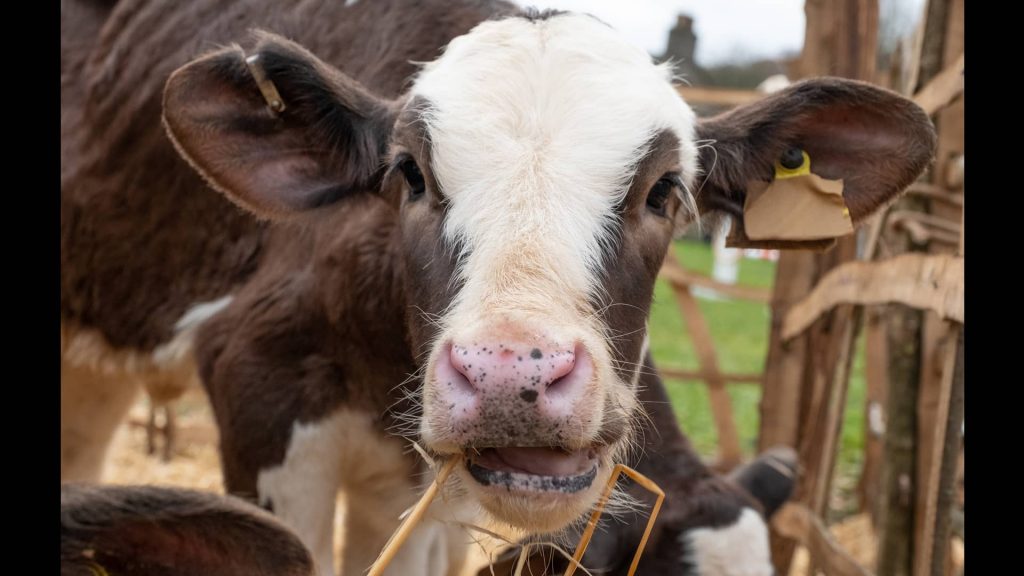

On the production, you can't use one cow on its own: it must always have a companion, because cows are herd animals.


Clark cites geese and chickens as common in period drama because back then, so many people kept them for eggs and meat.


Chickens on location in the Yorkshire Dales.
Regulations require that cows must have a companion, because they are herd animals.


Anna Madeley (Mrs. Hall) holds the much-loved dachshund, Frankie.


Animal handler Jill Clark on the set of All Creatures Great and Small.
Callum Woodhouse [Tristan] says he was madly in love with an Alsatian dog who appears in Episode 5, who is supposed to be so fierce and snarly with its bark, but in real life just wanted to be cuddled and lick his face and give kisses.
That’s Sheila. She’s soft as butter. Absolutely adores everybody. She’ll either work for a ball or a brick—she absolutely loves bricks, she’ll dig up bricks, so if you want her to dig, just bury a brick and she’ll dig there forever. God knows why, but that’s her passion. She was a rescue dog—she was dumped outside Battersea Dog’s Home with two puppies. One of the keepers kept the surviving puppy, and then they put her up for homing, and we were lucky enough to take her on. She’s absolutely a dog in a million. Really, really wonderful.
Several cast members have also raved about a dog named Frankie…
Frankie, my sausage. Frankie is actually curled up on my knee right now—he’s very rarely off somebody’s knee! Frankie’s a little dachshund. He was given to me by a friend. I’ve had dachsys most of my life and I’d just gone through a dachsy-free stage and I said to a friend of mine how much I really miss them. “I’m not coping without my dachsy!” So he brought one over from the Czech Republic and I ended up with one at eight months old. Like Derek, he’s just a lovely, lovely little dog. He just fits in with everything and he’s super to train—he’s very clever. He’s been an absolute delight to have. He’s a perfect lap dog.
Are there any animals (besides horses) that are more popular in period drama?
Chickens and geese, because pretty much everybody used to keep them for their eggs and their meat, so there were an awful lot of chickens and geese. They were in the people’s gardens, they’re on small holdings, they’re wandering the streets, they’re in market scenes. So of course, we have them up there.
What animal might it surprise us viewers to learn is a great actor?
Rats. Rats and pigs, they’re very, very clever.
Are there any animals that you wouldn’t want to work with, even if they were requested?
Squirrels. I don’t have a good relationship with squirrels. It’s probably one of the only animals that have ever bitten me. They’re very fast, and they’re so unpredictable. They’re just hard work. I don’t want to take them on. Let somebody else do it.
How did you get into this business?
Years ago I used to run a dog training school, and there was a local agent who phoned up and said, “Could you train a dog to bite a postman?” They were doing an ad campaign about dogs biting postmen and they actually wanted to put postman being bitten on their poster! So I had a little border collie that used to do a lot of man work, and I trained it to just nip the end of the trouser leg and pull. I did that, and then we had to do a reshoot, and then they asked me to go on and do a feature film. The first one I did was with Mel Gibson, The Bounty. Then Legend, with Tom Cruise. That was 38 years ago, and I’ve just carried on ever since.
You just fell in love with the work?
It was a passion for the animals. I just love working with them. I don’t know where it came from—we weren’t even allowed a goldfish when I was young, we had no animals. My father didn’t like them, was scared of them, didn’t understand them. So that was it. I didn’t have connection with them until I left home.
That’s a hopeful message, I think, for people who aren’t allowed animals in their youth: that anything is possible. Did you have a relationship with James Herriot’s books? Did you read them when you were young?
Oh yeah, I read all of them. And I used to watch the original series. Fantastic series, but I think ours is better.
Is there anything that you’ve learned in the spirit of James Herriot, from your work on the show? Or was his way of treating animals already incorporated into your worldview?
It’s already been incorporated. The thing I have learned from doing the series was how to move cows around Yorkshire! That was quite daunting.








